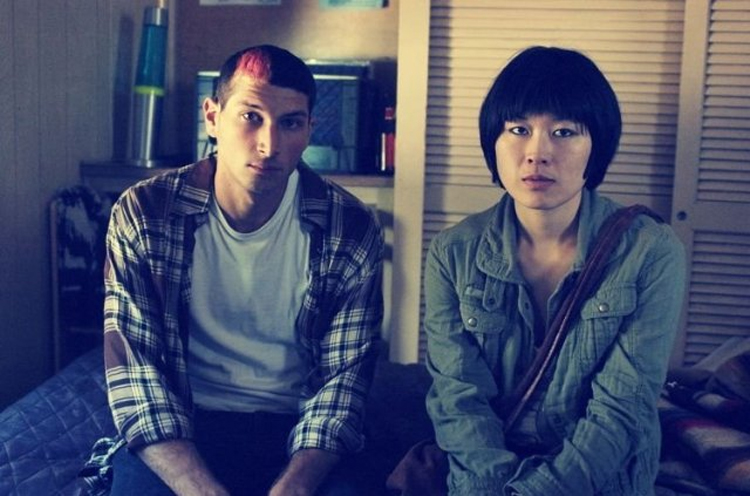UNDER THE RADAR Pearblossom Hwy
MIKE OTT’S PEARBLOSSOM HWY REACHES for reality, in a real way, sort of.
LA filmmaker’s Mike Ott’s last movie—LiTTLEROCK (2010) was a surprise smash in indie terms, racking up the kewpie dolls at LA’s AFI Fest, indie fests in Boston, Reykjavik, and Montreal and the Independent Spirit and Gotham Awards—the latter included a limited commercial theatrical run in NYC. Eventually the moody low-budget feature was picked up for DVD distribution by Kino Lorber and instant streaming on Netflix.
That’s a helluva act to follow, and expectations have been riding high for Ott’s follow-up, Pearblossom Hwy, which had its North American debut at the AFI Fest in November and is currently making the rounds of the festival circuit. A sequel of sorts, Pearblossom seems to pick up with the two main characters of LiTTLEROCK—Japanese tourist Atsuko/Anna and SoCal white-trash stoner Cory—a couple of years down the line, but still stranded in the buttcrack of the Antelope Valley.
At least Cory seems to be the same character—though he seemed to have a dad in the earlier movie—the latest hinges on a road trip to reintroduce him to the man he believes to be his biological father. Atsuko is now an immigrant reluctantly studying for her citizenship test, and has picked up considerably more English than the none she conspicuously spoke in LiTTLEROCK. Several ofLiTTLEROCK’s strong support cast—Roberto Sanchez for example—show up in other roles inPearblossom.
Fans of LiTTLEROCK might find this slightly disorienting, but it’s really just the first level of a complex and rewarding indeterminacy at the heart of Pearblossom’s successful simultaneous embodiment of bleak alienation and heart-rending humanism. Not to mention a healthy dose of hilarity—usually accompanying Cory’s attempts to fend off or cope with the demands of the square world. His attempts to make something of his life are pretty much limited to compiling a rambling, drug-fueled audition tape for a reality show called The Young Life, and jamming with Cory & the Corrupt, his death metal band.
The deeper ambiguities of identity and authorship are embedded in Cory’s recurring video diary sequences, where he talks about his history, family, sexuality, and ambitions, or recites fragmentary poems and song lyrics. These were generated when Ott gave the actor Cory Zacharia a camera and told him to start recording whatever was on his mind, which—over the course of several months—added up to over 100 entries. The cream of the crop are dispersed along the story arc, as the character Cory Lawler confronts his feelings about his domineering older brother and absent father, and explores his ambiguous sexual orientation—until close to the end, when the director’s offscreen voice interrupts one of Cory’s monologues to ask “Are you talking about your real Dad or talking about your Dad in the movie?”
Atsuko’s blurred boundaries are subtler, if no less compelling. Luminously portrayed by screenplay coauthor Atsuko Okatsuka, the character draws heavily from Okatsuka’s life experiences, though she was careful to point out at the after-premiere Q&A “I’ve never actually been a prostitute.” The character Atsuko finds herself engaging in the world’s oldest profession in between working in her uncle’s tree nursery and boning up for the green card exam. Profoundly isolated, she’s trying to save enough money to return to Japan to see her ailing, beloved grandmother. Most of her dialogue is conducted over the phone with her grandmother or with a bemused but sympathetic Japanese john, rather than with her ostensible best friend Cory. Their greatest moment of intimacy occurs in a repertory theater, as both cease any effort to communicate and stare at the screen, enraptured by Chaplin’s The Kid.
Pearblossom Hwy manages to up the ante for the new wave of DIY auteurism that LiTTLEROCKexemplified, and it’s no coincidence. Ott’s seat-of-the-pants semi-improvisational approach has often (and rightly) been compared with that of John Cassavetes and Robert Altman, but Pearblossom is a declaration of affinity with a cinematic canon at once more respectable and more troubled: La Nouvelle Vague.
To signal his intentions, Ott quotes the cartoonish gunshot effects that punctuate the soundtrack in Godard’s 1966 lo-fi masterpiece Masculin F&eactue;minin—a notoriously episodic and technically anti-virtuosic (or at least anti-craft fetishistic) slice-of—The Young Life of Paris, studded with scenes of ill communication. With Cory Zacharia as the new Jean-Pierre Léaud, Ott updates Godard’s bleak survey to address the contemporary phenomenon of digital globalization, and its border-dissolving impact on our understanding of reality, fiction, and self. At its core, though, Pearblossom Hwy is riddled with a redemptive humanistic compassion beyond Godard’s capacity, leaving us strangely hopeful, in spite of the darkness of Ott, Okatsuka, Zacharia, and company’s vision of the American Dream.


